Architecture in Time
A Review of Alan Moore and Eddie Campbell's FROM HELL
by Bala Menon
Alan Moore, long known as one of comicdom's finest writers,
joins with Eddie Campbell to produce this tale of Jack the Ripper.
|
Here, Moore builds a tale that stretches in ripples across time,
as he attempts his own explanation of the Ripper murders.
Not a three-dimensional pattern across Whitechapel, but rather a
four-dimensional pattern across time, with the effects
(and causes) of the Ripper murders travelling across the
centuries, one man's plan to transcend his own mortality,
at once an act of personal worship as well as an attempt
to exalt himself and finally attain the face of God.
Focusing, not from the point of view of the hunters, but
of the Ripper himself, Moore analyzes the available information,
chooses whom he believes to be the most likely Ripper,
and projects the suspect's beliefs and motivations from what
is known of his life. The result is an appallingly dark story,
made even more horrific by the non-randomness, the callousness
of the killings.
Immensely erudite, a rationale is presented for the Ripper
murders. Not simply a hack-and-slash murderer, lashing out
mindlessly at any woman who crosses his path, but rather,
an intricate plan, aimed at specific targets, for a specific
purpose.
|
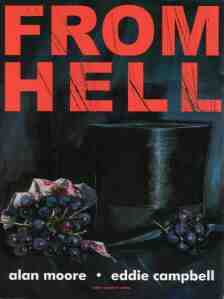
|
Campbell, a noted storyteller in his own right ( Bacchus, Alec),
lives up to Moore's highly demanding scripts,
portraying the dark immensity of London, from the hulking
cathedrals towering above the city, to the people running
through the streets.
This is the Ripper's story. From his early beginnings as a child,
curious to learn the inner workings of the cosmos;
to his professional rise, to become the Royal Physician;
to his vision-inducing heart-attack, and awakening to knowledge
of his Master; and to his final quest to further exalt that Lord.
Not quite the malefic slasher of stage and screen, but a
logical, intensely faithful man, carrying out what he believes
to be his self-appointed mission for God.
But it is also London's tale, a tale of the city of that time
and her people. Of the horror that existence holds for the people
of that city, of several simple, callous, unthinking cruelties,
that slap you in the face for their very unexpectedness.
Despite the grander themes shaping the flow of the story,
we are never allowed to forget the basic humanity of
these miserable players on the stage
There is no character in this tale so depraved, so brutalized, but that
Moore and Campbell make them touch our hearts, see some small spark
of humanity that we might empathize with. And thus further feel the
horror of their tale.
The People (and London's architecture)
Moore and Campbell's characters are living, breathing people,
bringing the London of 1888 to vivid life in our heads.
Sir William Withey Gull is a fanatic, a man so lost in his
own terrible vision, that he is willing to do whatever it
takes to achieve it, twisting his associates' arms, preying
on the fears of his superiors, using his own unshakable will
to forge through all obstacles like a juggernaut. A stern
man, raised to hold Duty above all, but his devotion to that
Duty swathes him in rapture.
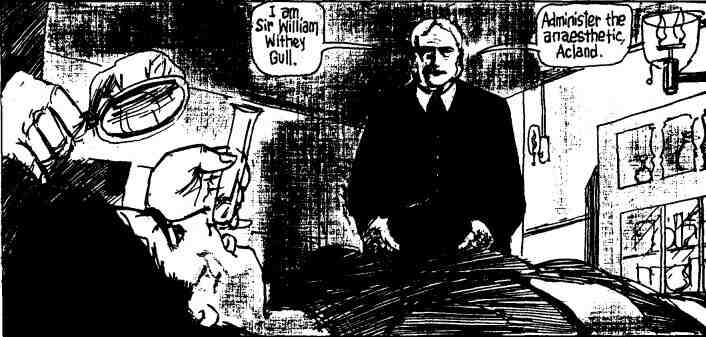
Gull, alone, of all the characters here, rises above the demands
of the earth that he is rooted in, to seek out a higher, spiritual
plane. He maintains an ethereal attitude, striving to complete his
self-appointed task despite the frailty of his human tools, the
other players on this stage are very firmly rooted in their earth.
|
Moore takes a particular delight in parallels and
double entendres, running through all his writing,
In another of these, Gull is paired with Netley,
an ignorant and unthinking man of the streets,
a person conscious of nothing more than his
desire to get ahead in life, a man very much of the earth,
seeking higher knowledge only to aid him in this world.
Netley's shallowness, ingratiatingly servile nature and
alarming stupidity make him the perfect unthinking tool for Gull
to use.
|
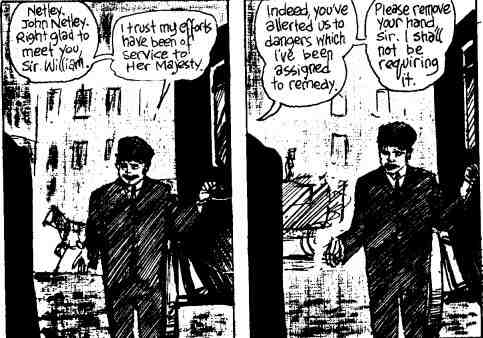
|
Netley is a little man, all too conscious of it, and seeking
power and advancement; yet, when he realizes the nature of the
immense maelstrom he has gotten himself into, he panics, collapses.
It's not the idea of murder that bother Netley; life itself is cheap
in London of the time. No, it's the consciousness of being totally
overwhelmed, enveloped by an all-encompassing power that is now
an inextricable part of his daily life; it's Gull's staggering revelation
that he always has been surrounded by this grand magic.
Awakening produces terror here, rather than the grand enlightenment
and vision provided to Gull. (Chapter 4 pages 36-37)
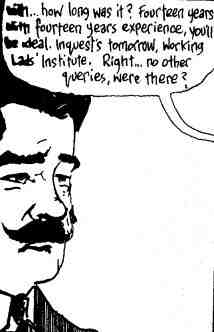
|
Inspector Abberline is a man thrown back into a brutalized,
decomposing part of London that he loathes, but is forced
back into, out of political necessity.
|
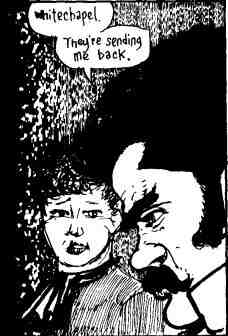
|
|
Notice Campbell's depiction of the explosive frustration on Abberline's
face, as he is transferred back to Whitechapel, the seat of his contempt;
and contrast this to the disgust on his face when he realizes the true
game being played within the corridors of power that he had
coveted (Chapter 13 pages 8-11)
There's more than a small part of Abberline which empathizes
with the denizens of Whitechapel; very much a man of the soil,
it had been his home for fourteen years, and he knows it better
than he understands the new realm of privilege that he has been
drawn into.
|
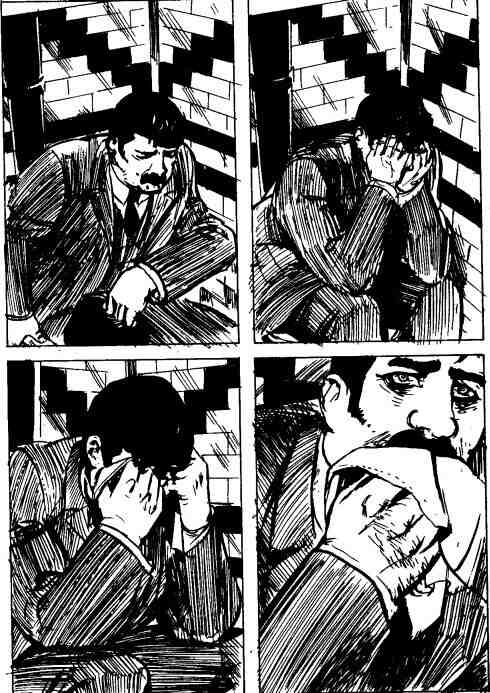
|
|
The prostitutes, Gull's targets, are perpetual victims,
desperately trying to stay alive in a London that makes
even day-to-day living difficult.
Look at Campbell's Chapter 5, where he visually contrasts
the two Londons, Gull's London of privilege, and the
hellish London of the poor. Soft grays ease Gull into his
daily routine, while sharp cold blacks topple the women
out of their peaceful sleep into London's cold.
The Ripper's victims are not particularly lovely women,
and cannot said to be leading a happy life by any means.
Observe the stark, hopeless terror of the prostitutes, faced
with death or worse at the hands of the London mob (Chapter 3)
And yet Campbell never fails to sink in a needle to remind us
of their humanity, time and again; Mary Kelly's calm, quiet
smirk (Chapter 3, page 14) or the piteous misery of Annie
Chapman (Chapter 7 page 5); or Kate Fellowes snatching
a few moments of joy, in the midst of her drudgery (Chapter 9)
it becomes impossible not
to feel their torment, the sad, heart-rending despair, of a person
condemned to this Hell through no fault of their own, and now
unable to even conceive of an escape from it.
|
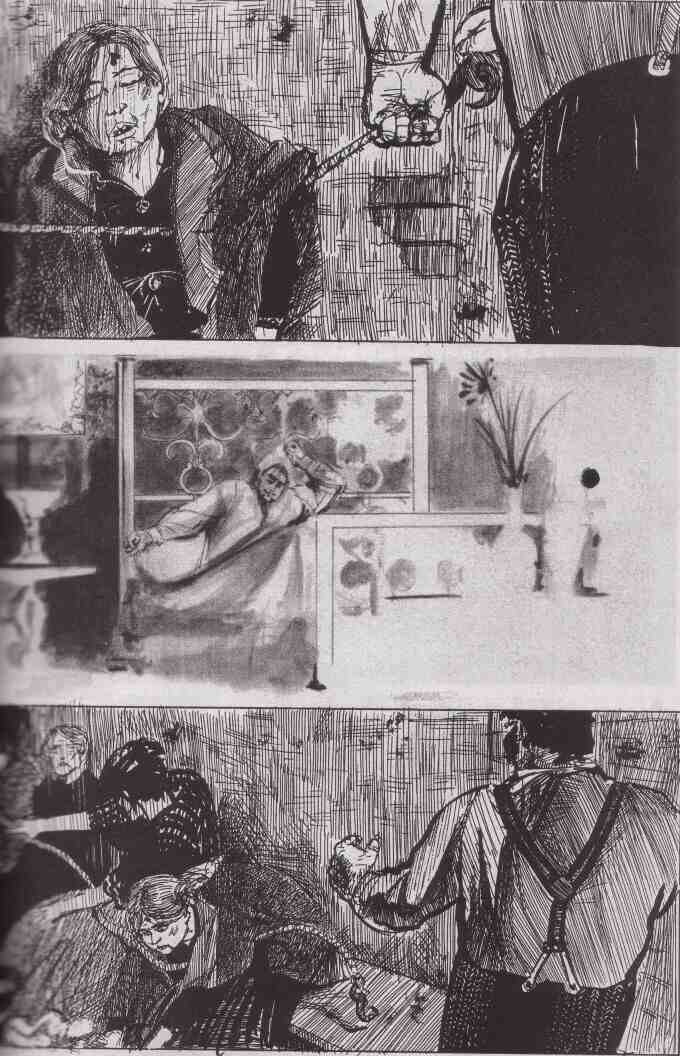
|
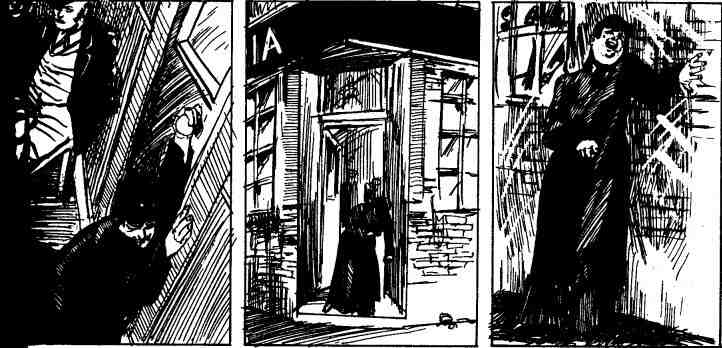
London is no less a character in this tale, enveloping
and shrouding the characters, driving them down its chosen path.
|
In the astonishingly powerful Chapter 4, we first see the
grand plan drawn out by Gull, and the forces surrounding him
that he capitalizes on to fulfil his task.
Here, we see Gull's chilling revelation of his ultimate goal, made
even more terrifying by the look of complete satisfaction on his face
Gull's studies through Masonry have revealed to him the grand
plan behind London's construction;
the menacing constructions not only exalting the Deity but
also stripping away the humanity from the little man;
not bringing the man up to the level of the Deity, but
rather stressing the difference between them, making man
far more acutely aware of how very little a thing he is.
Every little detail, from the grand to the mundane, from
the overpowering dome of St. Paul's, to the simple horse-brasses
mounted on every carriage in London, bears witness to
the grand magic mounted in this city.
|
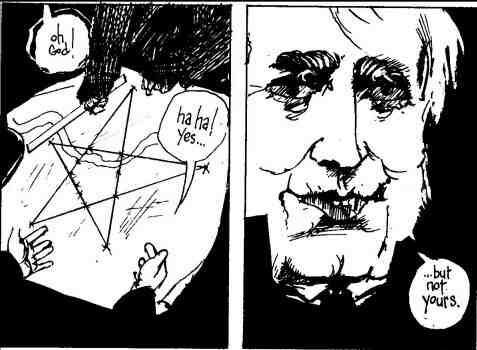
|
The city, an immense occult engine, prepared by occult architects
and Masons through the ages, is now primed and targeted, prepared
by a kill, and aimed at her Queen's foes by a fanatic willing to
do anything for his Liege, and more, if it also serves his
Deity. (Actually, serving his Liege is only incidental to Gull's
higher plan, "the very tip of the iceberg". Victoria does not
suspect what she has unleashed, in her attempts to protect her
family's reputation.)
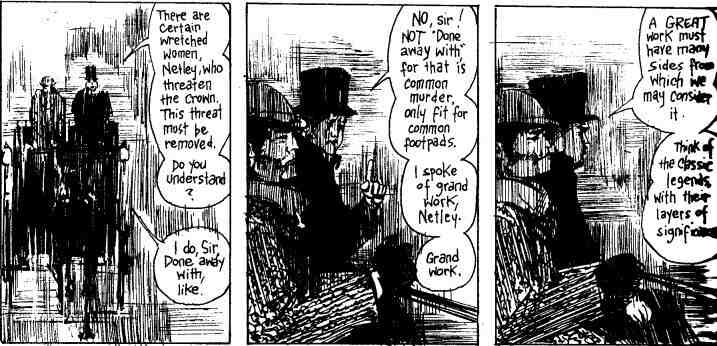
As Hawksmoor built up the colossal London above,
so too does Gull now build up his task in the streets below.
London's innocents are expendable pawns in a plan to extoll
the Gods, and thereby complete Gull's mission on Earth.
Magnifying and focussing London's darkness ...
For London is Hell ...
Strangely, the protagonist does not seem to cause as much agony
and despair as the environment itself. Whitechapel, a Hellish
nightmare to its poorest inhabitants, produces far more misery
to its people than Gull. Campbell does more than justice to
Moore's script, in producing an image of a Pit, its frightened
inhabitants preying on each other, resigned to their fate,
perpetually yearning for a better existence but without any
real hope of one, desperately snatching at whatever small
morsels of joy they can extract from the darkness.
This London is a very Hell ... and there are no happy characters
here ... all of them suffering, in one way or another:
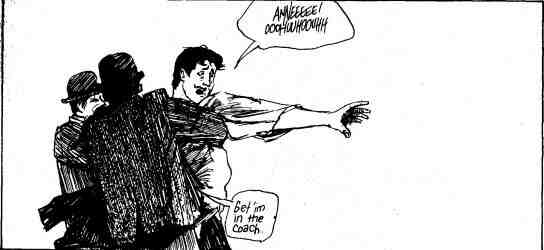
|
A Prince, bullied and controlled by his Imperial mother,
denied any chance of his own happiness;
|
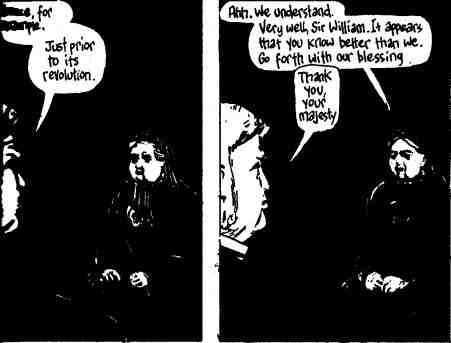
|
The Empress herself, fearing revolution, living a cold and
loveless existence;
|
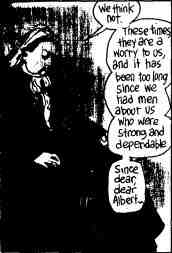
|
|
A shopgirl, robbed of her very mind, a pawn tossed about the
chessboard by forces beyond her control;
|
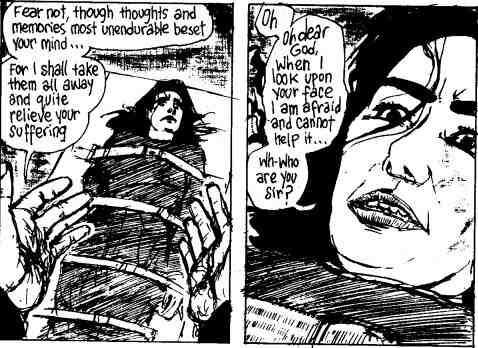
|
|
The prostitutes of London, cursed into an early life of despair,
with little hope of improvement;
|
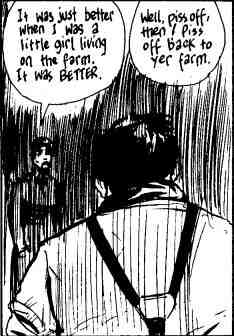
|
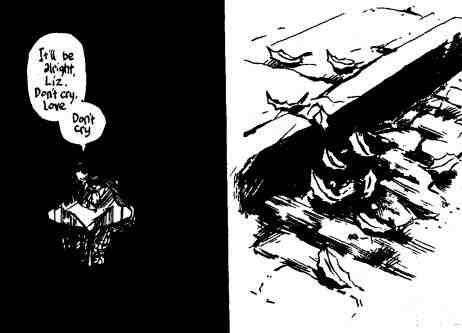
|
The Elephant Man, condemned to the Hell of his own body,
but dreaming of the Heaven revealed to him by Gull;
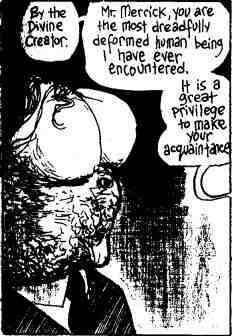
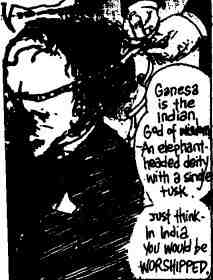
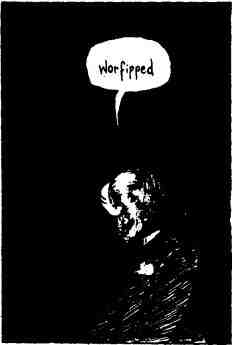
|
Gull, himself, escaping a mortal Hell by an attempt to
seize Heaven
|
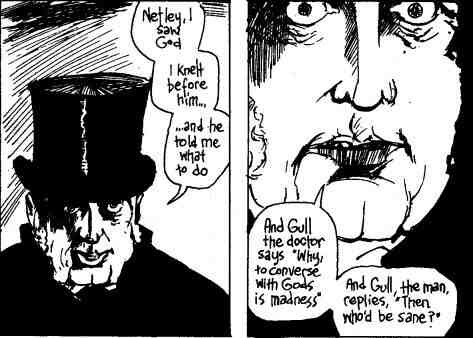
|
The closest any of these characters ever come to Heaven is
through their interactions with Gull; his casual words
presenting the vision of a better world to John Merrick;
and the few moments of childlike joy we see on the face of
Polly Nicholls, a young woman robbed of her childhood, are those
given to her by Gull, just prior to her death at his hands;
a final contact with Gull's luminous Heaven, just before she
passes out of the Hell that her life had become.
We are all of us in the gutter, but some of us are
looking at the stars." - Oscar Wilde
In Moore's book, the only person who is looking at the stars
is Gull himself. All the others are so lost in the pain of the
gutters of Whitechapel that they see nothing beyond; no hope left.
An occasional desperate dream of escape is all that's left to
them, followed by the inevitable and quick dash of reality,
and a return to their hopeless lives. Gull alone sees the
glory of his task, permeating all the world.
Finale
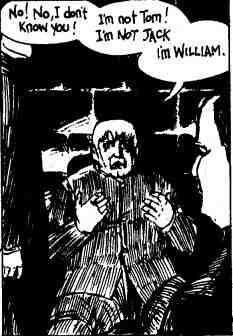
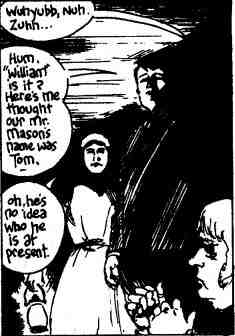
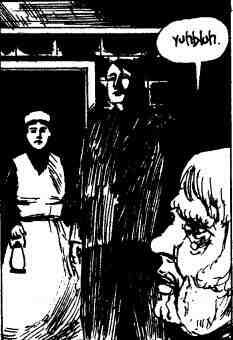
|
In another of Moore's mirrors, note Chapter 14, where
Gull simultaneously plumbs the depths of madness,
as he rises towards his ultimate goal, far above the
common rut.
This is Gull's final triumph ... escaping from the earthy surroundings,
into the grander, larger design that surrounds him.
Then further, outside even the three dimensions, into the
larger fourth; and finally, into the face of God.
And the power of that ascension casts ripples through time,
as the strength of Gull's faith, the intensity of his belief,
affects others in his wake. The completion of his grand
achievement simultaneously hurls him into the heights
of his final goal as well as into the depths of madness.
He is swept up in the rapture that envelopes him, but
rapidly losing all connection with his earthly life
As he has made use of the structures built around him
over time, so too does he now create his own occult
structure, one extending through time, and spreading its
ripples down the years.
And the strength of his creation influences other minds
across the years, reflections and imitators, shadows of
the original Ripper, sympathetic minds walking the path
first traced by Gull;
the grand design arising in shallower circles (first a
century, then fifty years, then twenty-five and so on),
moving through time towards a convergence
And Gull's ascension completes, his mind reaching eternity,
finally escaping his earthen body.
|
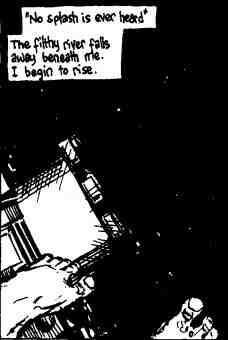
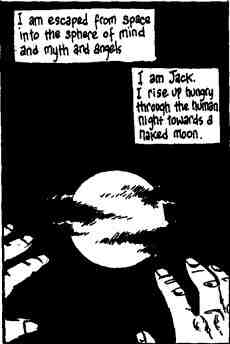
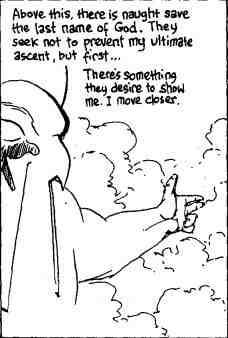
|
Moore combines a skillful blend of research and fiction,
not resisting the appeal of including several coterminous
characters and vignettes (Crowley's presence in London,
Hitler's birth) to bolster his tale across time. The
detailed glossary of his research and annotations of his
work in writing this book gives still more insight into
the creative process behind it.
In the final appendix, Moore wryly makes note of the work
done by prior Ripperologists, observing their effect on
each other (including his own work).
He acknowledges the immense quantity of legend that has
built up around the Ripper, and the extremely muddy line
drawn between myth and reality (often crossing boundaries),
and his own contribution to those legends (further muddying
and blurring the waters).
This is easily one of the finest works in the medium,
and well deserves a place on any reader's bookshelf.
Richly detailed, the book rewards multiple reads with
new insights into the tale.
Review (c) Bala Menon , 2001
All images on this page (c) Alan Moore and Eddie Campbell,
and used under the Fair Use doctrine
FROM HELL (c) Alan Moore and Eddie Campbell, 1989, 1999

























